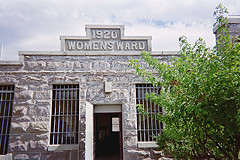|
|
|||||
|
|
|
||||
|
1920 Womens Prison in Boise Idahol
Darlie Routier -- Michelle Knotek -- Karla Homolka Diane Zamora Mora -- Diane Downs Global Perspectives on Re-Entry: Exploring the Challenges Facing Ex-Prisoners By Ikponwosa O. Ekunwe and Richard S. Jones(eds.), IkponwFlozelle Woodmore, 39, has lived her entire adult life in prison. Classified as a trouble-free, minimum-security prisoner, she lives with seven women in a cell designed for two including maximum-security inmates and others with serious emotional disorders. Violence in the Lives of Incarcerated Women. Research indicates that women’s imprisonment is largely attributable to drug addiction, prostitution, and retaliation against abusive partners; survival strategies to cope with overwhelming physical, sexual, and psychological victimization. Many were first arrested as juveniles because they ran away from home to escape abuse. Treatment of Incarcerated Women With Substance Abuse and Posttraumatic Stress Disorder NCJRS Sexual Misconduct and Shackling of Pregnant WomenLocked up - Locked down: A mother's love for her child An article by an incarcerated mother about not giving up hope for her child. "While inside, we need to fight within ourselves to stay together because though we don't know where our children are- we still care. I tell my story to uplift other incarcerated mothers, and to reach my son. This goes out to you, my beloved. " Free Battered Women (FBW), is a grassroots coalition of currently and formerly incarcerated women, their families, activists, attorneys, students, community members, and other dedicated individuals who strive to end the re-victimization of battered women in prison. Incarcerated Parents and Their Children - In 1999 an estimated 721,500 State and Federal prisoners were parents to 1,498,800 children under age 18. Longest imprisoned Female Political Prisoner - Ngawang Sangdrol has had her sentence extended by nine years. With a total of 18 years behind bars, she will be the longest imprisoned female political prisoner in Tibet. Female juvenile delinquents - Juvenile courts in the US processed 1,755,100 delinquency cases in 1997. 23% of the delinquency cases processed in 1997 involved a female offender, compared with 19% in 1988. Between 1988 and 1997, the number of delinquency cases involving females increased 83%. Keeping Incarcerated Mothers and Their Daughters Together - Girl Scouts Beyond Bars - Children of prison inmates are the hidden victims of their parents' crimes. Like children of divorced or deceased parents, they often show signs of distress caused by the lack of a stable home life and parental separation, such as depression, aggression, poor school performance, and truancy. Many times they also follow their parents' criminal behavior patterns. To keep mothers and daughters connected and to enhance parenting skills, Girl Scouts Beyond Bars involves mothers in their daughters' lives through a unique partnership between a youth services organization and State and local corrections departments.
Kari
& Associates |
|

